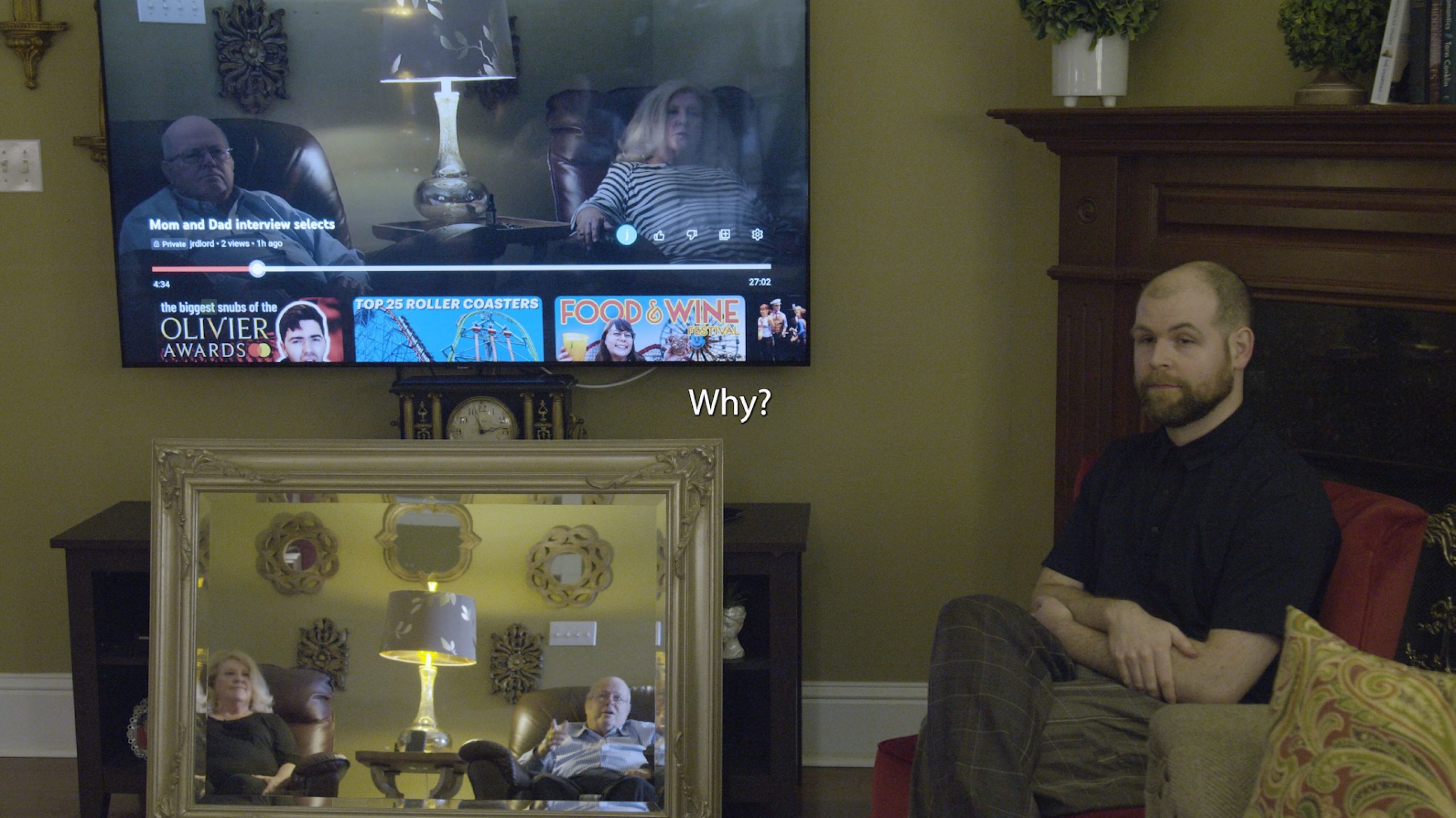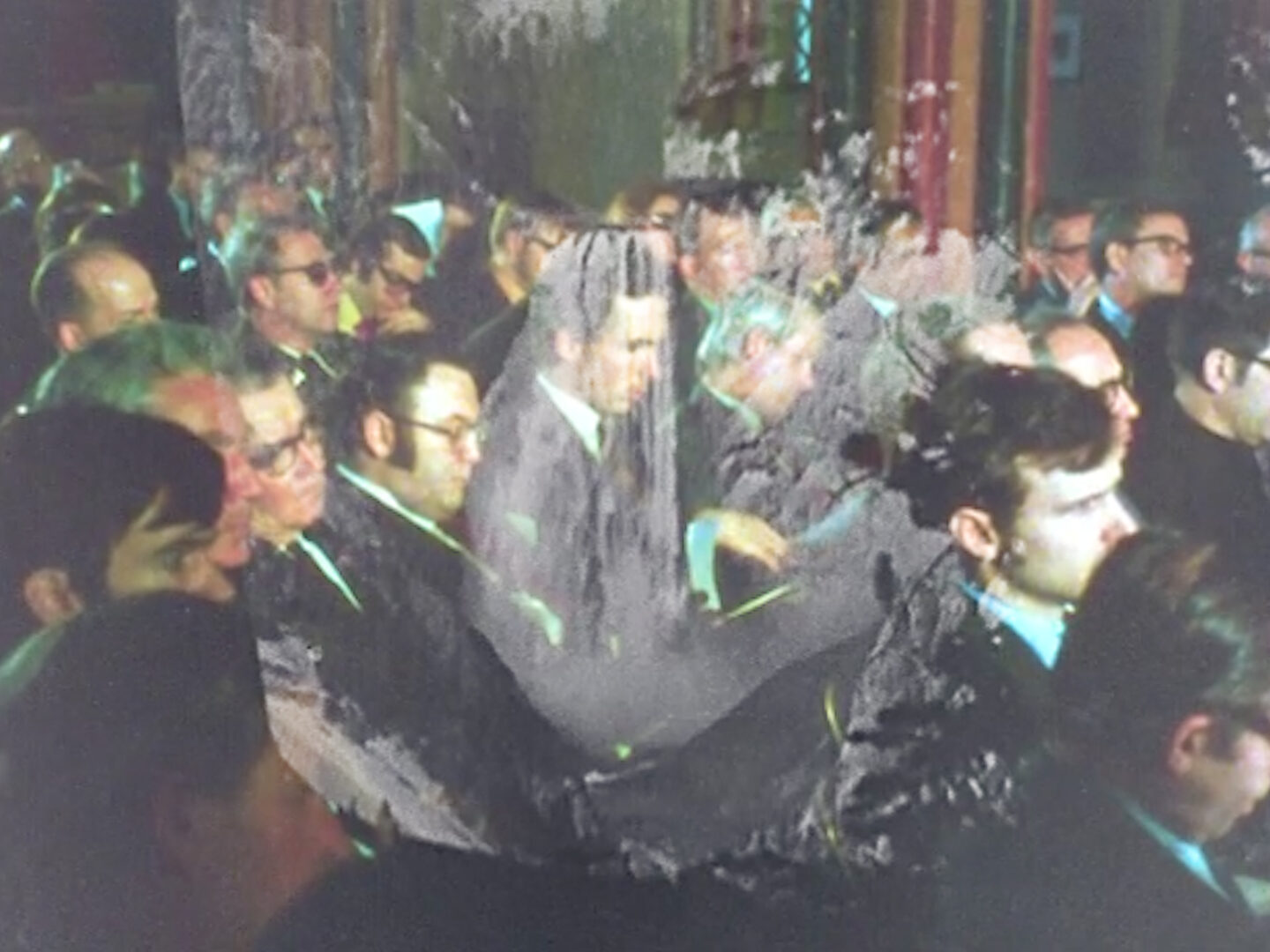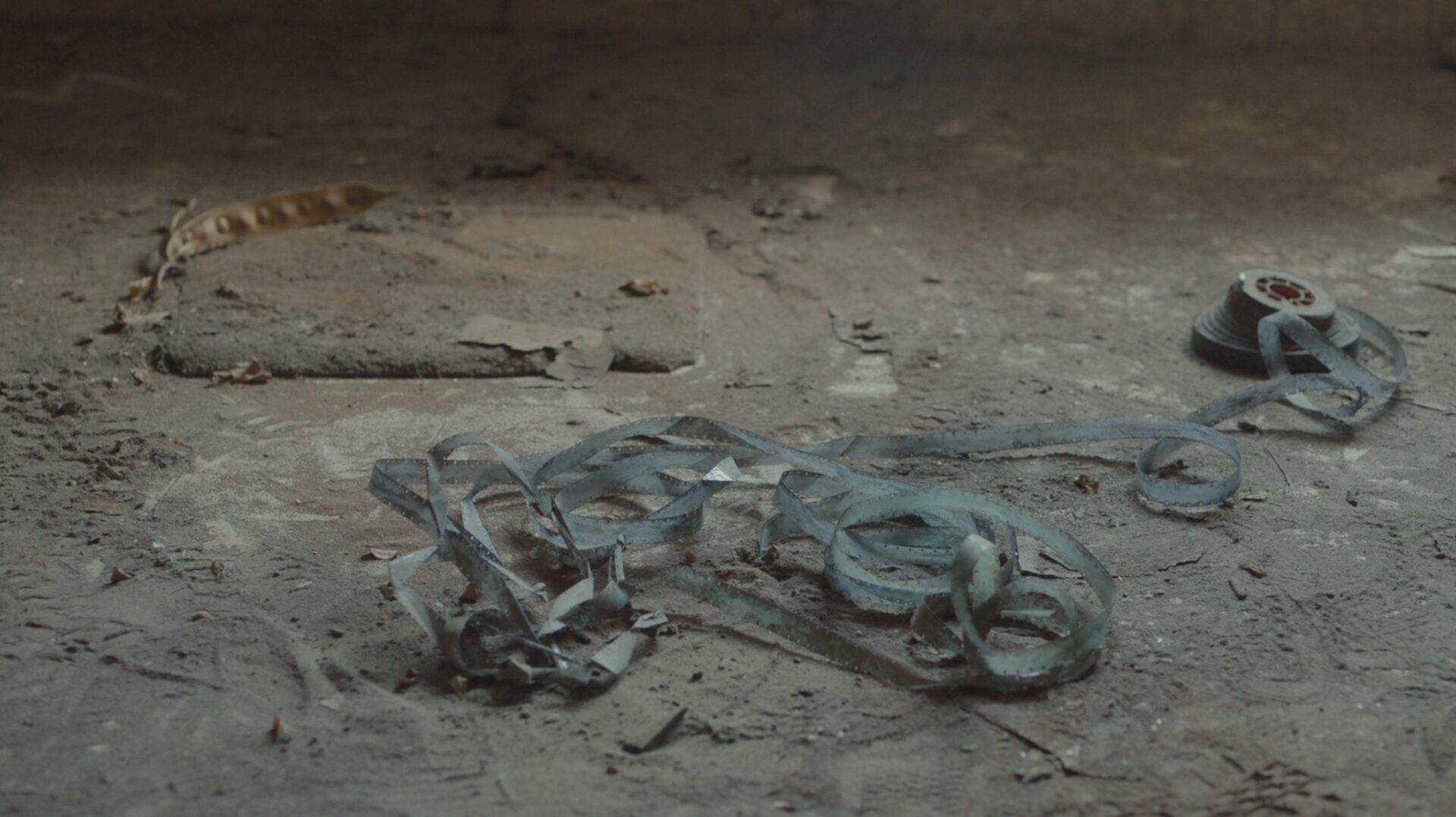
- This event has passed.
Jordan Lord | The Voice of Democracy
November 10, 2023– March 8, 2024
Free
Image description: A still from the film The Voice of Democracy shows a dim living room, in which a tv hangs on the wall. The tv displays two older white people, the filmmaker’s parents, sitting with a gold lamp in between them. The filmmaker’s father looks angry and their mother looks concerned. The tv image is paused on a Youtube window, which reads: “Mom and Dad interview selects,” below which a series of other videos are recommended including “The Biggest Snubs of the Olivier Awards,” “Top 25 Roller Coasters,” and “Food & Wine Festival.” Reflected in a mirror below the television are the filmmaker’s parents sitting in the same set-up as their image on the television, with the same gold lamp between them. They are looking across the room at the filmmaker, a 30-something white person with a buzzcut and a beard, who looks back at them with their arms folded and legs crossed, with a serious and sympathetic look. Their father is pointing at the television, saying something. In the center of the image, between the mirror and the television, is a caption that reads, “Why?” Image and image description courtesy of the artist.
Opening Friday, November 10, 5–8 pm
Free and open to the public
On view Tuesdays–Fridays, 12–5 pm and by appointment, extended through March 8, 2024
Email ekrem@squeaky.org for appointments, including fully masked visits
Squeaky Wheel is excited to present The Voice of Democracy, a solo exhibition by Jordan Lord. The multimedia exhibition analyzes the politics of voice and accent across disability, race, class, and gender, and how they shape the terms of entry to democracy.
The Voice of Democracy is anchored by Lordʼs personal story of winning a nationwide “audio essay” high school scholarship contest, presented by the Veterans of Foreign Wars (VFW). The installation features conversations with the artistʼs family and other participants regarding the contest, research into the history of the VFW, and a parallel set of reflections about the entanglements between access technology, (disabled) audiences, and nationalism. The work showcases how sound recordings are a vital player in the democratic process itself, and the role recorded voices play in perceiving (and creating) a crisis in the teaching of US history, politics, and civics.
The exhibition features four works – a written contract by Lord, and three video works that will be released over the duration of the exhibition. Through January 10, the exhibition features a promotional video for The Voice of Democracy competition, with audio description and open captions by Jordan Lord to provide greater context into the competition. At the opening, Lord will be present where they will deliver brief remarks.
Squeaky Wheel is delighted to finally welcome the artist in person for this occasion; Lord was previously a virtual Workspace Resident in 2021, and we had screened their feature film Shared Resources in 2020. The exhibition is presented as part of [Speaking in Foreign Language], a thematic series of events on voice, translation, legibility, and power.
This project was made possible through support from the Andy Warhol Foundation for the Visual Arts and Humanities New York with support from the National Endowment for the Humanities.
Public Programs
Friday, November 10, 2023, 5–8 pm
Exhibition opening with brief remarks by the artist at 7 pm
*Postponed* Saturday, December 2, 5 pm
Curatorial tour with Jordan Lord’s I Didn’t Set Out to Make a Film about Religion
February 19–23, 2024
Online access to the works in The Voice of Democracy. Sign up here.
February 23, 2024, 5:30 pm
Online and in-person: Screening of Jordan Lord’s How Is It That You Frame Old Glory in Your Mouth?, followed by a conversation with Jordan Lord, Abby Sun, and Pooja Rangan. Sign up here.
Saturday, February 20, 2 pm
Curatorial tour with Ekrem Serdar
Commissioned essay and documentation
Click here to read a newly commissioned essay on the exhibition by Amy Ching-Yan Lam.
Exhibition documentation by Squeaky Wheel and Calvin Hardick.
Image descriptions, left to right, top to bottom: A view of the installation of Jordan Lord’s exhibition “The Voice of Democracy” in Squeaky Wheel’s gallery space. On the left is I Didn’t Set Out to Make a Film About Religion, a red projected image on a wall, with a red color field and the captions “‘We Heart New College”, people holding cameras, police officers”. On the far end of the room is a person looking at a dimly lit television screen wearing headphones, featuring An All-Around Feel Good. On the television are a tree and captions underneath. 2. A seated person viewing How Is It That You Frame Old Glory In Your Mouth?, a video projected on a screen. On the screen is Jordan seated with their arms and legs crossed, and one eyebrow slightly raised. They are looking towards the camera. Next to them is a mirror showing Lord’s parents, Deborah and Albert, who are speaking to Jordan. Above the mirror is a television screen with video of Jordan’s parents as it’s been paused. There are captions in the middle of the screen: “I thought your essay was great, but it’s not…” 3. A person wearing a hat and sitting on a couch, watching a television screen that is showing An All-Around Feel Good. He is wearing headphones. An arena is on the screen, along with the caption “This barrier quite literally marks national borders” 4. A person holding Jordan Lord’s Documentary Participation Agreement, a stapled document over multiple pages. On the document is several paragraphs of text; the lighting is most aligned to the following paragraph “The standard appearance release agreement is premised on several necessary fictions, including the possibility that the filmmaker(s) are not responsible for what they choose to put into their own films; that representations of a person’s life, story, or likeness can rightfully become the sole property of someone else; and that the conversion of these representations into the filmmaker(s) private property secures a relationship of trust.”
Introduction by Jordan Lord
The show isn’t finished yet. Two of the videos I’ve just started on. The other one I only finished editing this week. I’m telling you this, less as an apology or an excuse, and more to think about how it changes the work you might find here.
In many ways, this show was prompted by seeing Ra’anan Alexandrowicz’s film The Viewing Booth. The film largely consists of recording sessions, where he films the reactions of a Temple University student, Maia, as she watches video documentation of apartheid in Palestine. The film is meant to question the limits of documentary images as a tool to change the minds of those who are already fixed in their beliefs. The film shows Maia in the process of seeming to waver in her Zionist ideology, when presented with brutal evidence of the violence of Israeli settler colonialism in the West Bank, only for her to end up casting doubt on the veracity of the images she sees. She decides that she cannot trust the images alone because all recorded images are shot from an inherently subjective point of view and claims that the videos would need more context, in order for her to believe them.
Growing up in a Zionist Christian evangelical family, there was little about Maia’s intransigence that surprised me. However, what most disturbed me about the film is the way in which Maia confirms her belief system, not through a lack of media literacy, but actually through tools of media criticism.
At one point, she reacts to a video recorded by a Palestinian father of his frightened children woken up in the middle of the night by the IDF raiding their home. She compares the beginning and end of the video––the fact that we don’t see what happened before or after the video was recorded––to cuts in a Hollywood film or tv show, arguing that the spatial and temporal frames of a video are forms of editing in themselves and, therefore, cannot be trusted as the whole truth. Of course, as Alexandrowicz points out to her, there are mappable distinctions we can make between video evidence, documentary film, and fiction. However, she remains unconvinced and becomes increasingly confident in her counter-reading of the images as constructed and, therefore, untrustworthy. In reflecting on the film, I feel starkly confronted with the fact that the analytical tools I teach in filmmaking classes are not necessarily enough to help students counteract the glut of disinformation and ideology in the media they encounter and can just as easily prompt dangerous misreadings and misperceptions.
I felt similarly disturbed when I learned that Christopher Rufo, the man described by some as “the most influential right wing activist in America” at the moment, began his career as a left-leaning documentary filmmaker. Right up until his 2019 fellowship with the conservative disinformation machine, the Claremont Institute, he was working on a PBS-commissioned documentary about poverty in deindustrialized cities, called America Lost. To look at the start of the film, one could easily mistake it for a fairly run of the mill liberal documentary. It’s only through the increasingly ideological voiceover that Rufo interprets what he sees, not as the ravages of capitalism, but the dissolution of the nuclear family. In his own self-narrative, when confronted with these images, he had to rethink everything he thought he previously knew, hamfistedly underlining his own film’s relationship to the liberal documentary as a tool for political conversion, even as he deploys its tropes for a conservative audience of the already converted.
It’s not just documentary strategies but criticality itself that Rufo wields as a weapon in the new culture war on liberal arts education. He has turned from the liberal documentary form toward making didactic Youtube videos that analyze all of our social structures as having been taken over by liberals, in the wake of the failures of Marxist movements of the 20th century. In these videos and talking head appearances on conservative media, he chases after the bandwagon while also perpetually testing out new dog whistles for racism, transphobia, and misogyny, popularizing Critical Race Theory and Gender Studies as household terms for conservative parents to use in school board grassroots organizing, prompting a new wave of book bans and racist history textbooks. The legislation he advised Trump on to defund DEI trainings in government agencies has been copycatted all across the country to make it much more difficult to teach things that were already quite difficult to teach, not only reanimating old classics like ‘the gay teacher who wants to make their students gay’ but also creating new analytical language for conservatives to prevent the classroom from being used to teach students the analytical tools to be able to recognize these tactics and the historical context to be able to situate them. (1)
Over the same period of Rufo’s rebrand, I’ve been trying to figure out how to make a living, teaching in various liberal arts colleges, recently moving across the country to take a full-time job. In my teaching, I try to foreground access tools like audio description and captioning as fundamental parts of making a film. When students are first exposed to the idea that these tools can be used as part of their creative practices, they often focus on the idea that all description is “subjective.” Although I, of course, agree that creative practices of description push back on the so-called “objectivity” of standard access practices, to name this work a process of making images “subjective” feels disturbingly resonant to me with Maia’s interpretation of what she sees in The Viewing Booth.
Although this might come across as semantic, what I want to understand about description––especially when it comes from more than one person––is whether it can be used, less for telling us something about images themselves and more about demonstrating the position of the person doing the describing. And maybe instead of thinking about these positions as fixed, we can think about description as showing how audiences are situated, in relation to what they see and hear (or don’t see and hear). Another way of putting this is that I’m curious about what these access practices, in which audiences describe what they see and what they hear, might be able to tell us about how a position forms and at what points it is challenged.
This feels particularly urgent to consider in this moment, in which students, teachers, lawyers, filmmakers, and artists––among many others––are, again, experiencing disciplinary and legal action, losing their jobs, and ending up on lists for taking a position about how they interpret images of Palestinian genocide. The images of this genocide hold their own self-evident facts, but the process of how they’re interpreted creates the political reality for those who live in relation to them. This is different from saying that the images are relative. – Jordan Lord
(1) And as Kay Gabriel highlights in her n+1 article, “The Anti-Trans Panic and the Crusade Against Teachers,” these strategies most likely have an economic motive of eroding solidarities between teachers unions and parents of public school students, rather than merely bringing conservative values to the classroom.
About the artist and writer
Jordan Lord (US) is a filmmaker, writer, and artist whose work addresses the relationships between historical and emotional debts, framing and support, access, and documentary. Their films have been shown at festivals and venues including MoMA Doc Fortnight, Dokufest Kosovo, Union Docs, and the Berwick Film and Media Arts Festival. Their film Shared Resources (2021) won the John Marshall Award for Contemporary Ethnographic Media at the Camden International Film Festival and the Critics Jury Prize at the Hot Springs Documentary Film Festival. They have presented solo exhibitions at Piper Keys and Artists Space. In 2021, they were profiled as one of the 25 New Faces of Independent Film by Filmmaker Magazine, and their work has been featured in publications such as Screen Slate, Millennium Film Journal, and Hyperallergic.
Amy Ching-Yan Lam is an artist and writer. She is the author of Property Journal (2024); Baby Book (2023), a finalist for the Governor General’s Literary Awards in Poetry; and Looty Goes to Heaven (2022). From 2006 to 2020 she was part of the performance art duo Life of a Craphead. Their exhibition Entertaining Every Second (2018-19) looked at experiences and legacies of the American War in Vietnam. She lives in Tkaronto/Toronto, and was born in Hong Kong.








